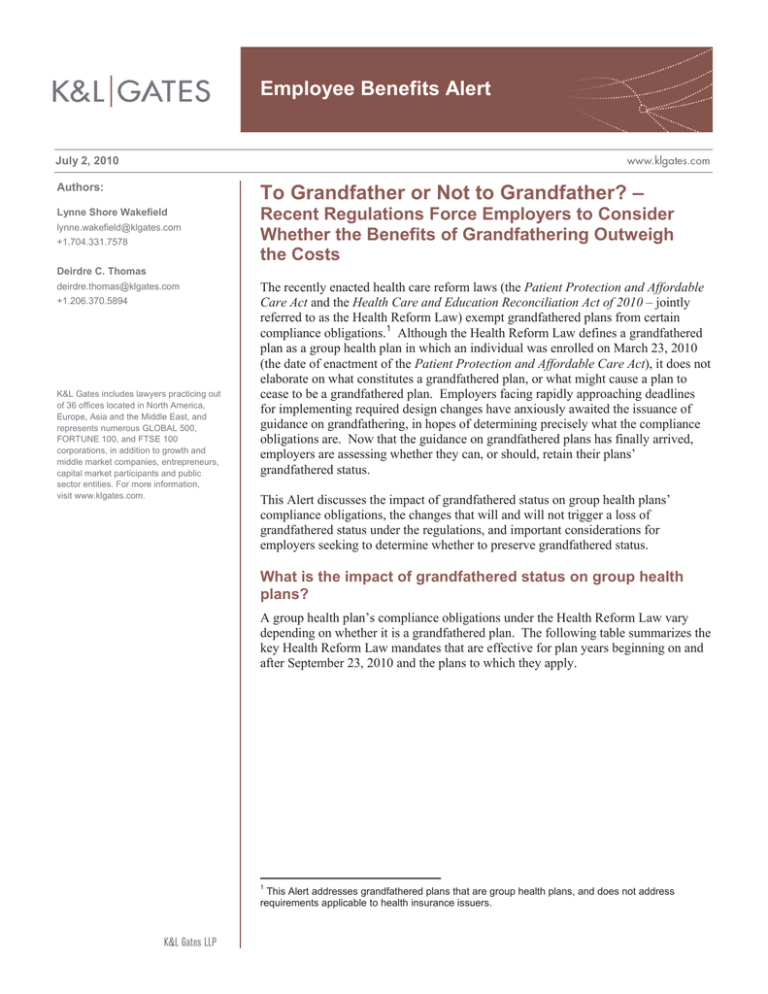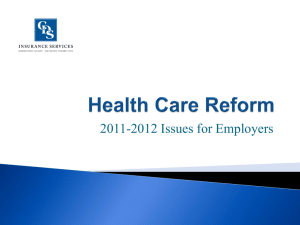
Employee Benefits Alert
July 2, 2010
Authors:
To Grandfather or Not to Grandfather? –
Lynne Shore Wakefield
Recent Regulations Force Employers to Consider
Whether the Benefits of Grandfathering Outweigh
the Costs
lynne.wakefield@klgates.com
+1.704.331.7578
Deirdre C. Thomas
deirdre.thomas@klgates.com
+1.206.370.5894
K&L Gates includes lawyers practicing out
of 36 offices located in North America,
Europe, Asia and the Middle East, and
represents numerous GLOBAL 500,
FORTUNE 100, and FTSE 100
corporations, in addition to growth and
middle market companies, entrepreneurs,
capital market participants and public
sector entities. For more information,
visit www.klgates.com.
The recently enacted health care reform laws (the Patient Protection and Affordable
Care Act and the Health Care and Education Reconciliation Act of 2010 – jointly
referred to as the Health Reform Law) exempt grandfathered plans from certain
compliance obligations.1 Although the Health Reform Law defines a grandfathered
plan as a group health plan in which an individual was enrolled on March 23, 2010
(the date of enactment of the Patient Protection and Affordable Care Act), it does not
elaborate on what constitutes a grandfathered plan, or what might cause a plan to
cease to be a grandfathered plan. Employers facing rapidly approaching deadlines
for implementing required design changes have anxiously awaited the issuance of
guidance on grandfathering, in hopes of determining precisely what the compliance
obligations are. Now that the guidance on grandfathered plans has finally arrived,
employers are assessing whether they can, or should, retain their plans’
grandfathered status.
This Alert discusses the impact of grandfathered status on group health plans’
compliance obligations, the changes that will and will not trigger a loss of
grandfathered status under the regulations, and important considerations for
employers seeking to determine whether to preserve grandfathered status.
What is the impact of grandfathered status on group health
plans?
A group health plan’s compliance obligations under the Health Reform Law vary
depending on whether it is a grandfathered plan. The following table summarizes the
key Health Reform Law mandates that are effective for plan years beginning on and
after September 23, 2010 and the plans to which they apply.
1
This Alert addresses grandfathered plans that are group health plans, and does not address
requirements applicable to health insurance issuers.
Employee Benefits Alert
Mandates for Plan Years
Beginning on and after
September 23, 20102
Application to Grandfathered and Non-Grandfathered Plans
Limits on lifetime and annual limits
on essential health benefits
Applicable to grandfathered and non-grandfathered plans
Prohibition on rescissions
Applicable to grandfathered and non-grandfathered plans
Dependent coverage to age 26
Applicable to grandfathered and non-grandfathered plans (before
2014 grandfathered plans do not have to cover adult children who are
eligible to enroll in an employer-sponsored plan)
Coverage of preventive health
services
Grandfathered plans exempt; applicable only to non-grandfathered
plans
Prohibition on discrimination
Grandfathered plans exempt; applicable only to non-grandfathered
plans
Appeals process
Grandfathered plans exempt; applicable only to non-grandfathered
plans
Patient protections
Grandfathered plans exempt; applicable only to non-grandfathered
plans
2
This Alert is not intended to address the substantive requirements of each specific mandate.
With respect to these near-term mandates, the most
concerning are the requirements to provide first
dollar coverage for certain preventive care and the
new appeals process. The Health Reform Law is not
clear on the scope of services to be covered under
the preventive care mandate (for example, whether it
encompasses only preventive services, or also
preventive drugs such as Lipitor), and guidance has
yet to be issued on this point. With respect to the
appeals process, the requirement to continue to
provide coverage while any appeal is pending is a
significant shift from current law, and it is not clear
what the requirements will be for the external review
process.
Grandfathered status is also relevant for additional
Health Reform Law mandates that become effective
in 2014. Grandfathered plans are exempt from the
2014 mandates relating to guaranteed availability of
coverage, guaranteed renewability of coverage and
nondiscrimination in health care. However, as the
preambles to the recently issued regulations
estimate that more plans than not will lose
grandfathered status by 2014 anyway, the 2014
considerations are likely less significant in
determining whether it is worthwhile to preserve
grandfathered status.
What actions will cause a loss of
grandfathered status?
Grandfathered health plan coverage is coverage
provided by a group health plan in which an
individual was enrolled on March 23, 2010. A plan
will maintain grandfathered status for as long as it
continues to meet the requirements of the
regulations. That is, there is no set date after which
plans will automatically cease being grandfathered
plans. The regulations apply separately to each
July 2, 2010
2
Employee Benefits Alert
benefit option made available under a plan.
Accordingly, a plan could lose grandfathered status
with respect to one benefit option without losing
such status with respect to other options offered
Changes Triggering Loss of
Grandfathered Status
Elimination of Benefits
Increase in participant’s
percentage cost-sharing
Increase in fixed-amount
cost-sharing other than copays
Increase in fixed amount copays
Decrease in employer
contribution rate
Changes to annual limits
Entering into new insurance
contract
under the plan. The following table summarizes the
actions in the guidance that will cause a loss of
grandfathered status.
Description
Elimination of benefits generally with respect to specific condition (e.g.,
elimination of treatment for cystic fibrosis)
Elimination of any necessary element to diagnose or treat a particular
condition (e.g., elimination of coverage for counseling where it is part of
covered treatment for mental health conditions)
Any increase (measured from March 23, 2010) in a cost-sharing
requirement expressed as a percentage (e.g., employee’s share of
coinsurance increases from 20% to 25%)
Increase (measured from March 23, 2010) in fixed-amount cost-sharing
(e.g., deductible or out-of-pocket limit) that exceeds medical inflation plus
15 percentage points
Increase (measured from March 23, 2010) in fixed-amount co-pays in
excess of the greater of (1) $5 plus medical inflation and (2) medical
inflation plus 15 percentage points
Decrease in contribution rate based on cost of coverage by more than 5
percentage points below the contribution rate for the coverage period that
includes March 23, 2010
Decrease in contribution rate based on a formula by more than 5 percent
below the contribution rate for the coverage period that includes March 23,
2010
Adding an annual limit where there was not one on March 23, 2010,
adopting an annual limit that is lower than the lifetime limit on that date or
decreasing an annual limit
Entering into a new insurance contract
Changes other than those listed above should not
affect grandfathered status. Examples of changes
that may be made without causing a loss of
grandfathered status include adding family members
of an individual covered on March 23, 2010,
enrolling new employees in existing coverage
(including individuals employed on March 23, 2010
who were not enrolled on that date), amending the
plan to voluntarily implement the requirements of
the Health Reform Law or to comply with other
legal requirements, and changing third party
administrators.
The Departments issuing the regulations have
invited comments on whether changes to a plan’s
structure (e.g., from insured to self-insured),
provider network, prescription drug formulary or
other substantial changes to the benefit design
should result in a loss of grandfathered status.
Pending the issuance of such additional guidance,
cautious employers who have implemented such
changes may choose to assume a loss of
grandfathered status.
Is there a delayed effective date for
collectively bargained plans?
There are no special or delayed effective dates for
self-insured collectively bargained plans, which
currently are subject to all of the rules described
above. Coverage under fully insured collectively
bargained plans is grandfathered until the expiration
July 2, 2010
3
Employee Benefits Alert
of the last collective bargaining agreement relating
to coverage that was in effect on March 23, 2010.
After the last of the applicable collective bargaining
agreements terminates, grandfathered status is
determined based on the regulations as otherwise
applicable.
What else should employers know
about grandfathered status?
A plan that intends to be a grandfathered plan must
maintain records of the terms of the plan as in effect
on March 23, 2010. When issuing descriptions of
plan benefits, such as a summary plan description, a
grandfathered group health plan must include a
statement indicating that it believes it is a
grandfathered plan and briefly describing the impact
of grandfathered status. The regulations include
model language for this purpose. A special, separate
communication is not required.
Transitional rules apply to certain changes that were
made to group health plans prior to March 23, 2010
but were not effective until after that date, or made
after March 23, 2010 but prior to issuance of
regulations. The regulations include anti-abuse rules
to prevent employers from using corporate
transactions or eligibility changes to circumvent the
grandfathering rules.
Do the benefits of grandfathered
status outweigh the costs?
The first impulse of many employers may be to try
to preserve grandfathered status for as long as
possible. However, given the limitations associated
with retaining grandfathered status, particularly
those relating to changes in cost-sharing
mechanisms, employers may wish to analyze the
relative costs and benefits of maintaining
grandfathered status. In particular, many employers
may find that the immediate costs and risks of the
unknown with respect to the mandates to provide
first dollar coverage for preventive care and the
appeals process are outweighed by limitations that
grandfathering status imposes on employers’ ability
to control rising health care costs through increased
co-insurance, co-pays and other cost sharing.
This summary highlights key provisions of the new
regulations. For analysis of the applicability of the
grandfathered plan rules to your particular plan,
please contact one of the individuals listed above, or
the K&L Gates lawyer with whom you regularly
work.
Anchorage Austin Beijing Berlin Boston Charlotte Chicago Dallas Dubai Fort Worth Frankfurt Harrisburg Hong Kong London
Los Angeles Miami Moscow Newark New York Orange County Palo Alto Paris Pittsburgh Portland Raleigh Research Triangle Park
San Diego San Francisco Seattle Shanghai Singapore Spokane/Coeur d’Alene Taipei Tokyo Warsaw
Washington, D.C.
K&L Gates includes lawyers practicing out of 36 offices located in North America, Europe, Asia and the Middle East, and represents numerous
GLOBAL 500, FORTUNE 100, and FTSE 100 corporations, in addition to growth and middle market companies, entrepreneurs, capital market
participants and public sector entities. For more information, visit www.klgates.com.
K&L Gates is comprised of multiple affiliated entities: a limited liability partnership with the full name K&L Gates LLP qualified in Delaware and
maintaining offices throughout the United States, in Berlin and Frankfurt, Germany, in Beijing (K&L Gates LLP Beijing Representative Office), in
Dubai, U.A.E., in Shanghai (K&L Gates LLP Shanghai Representative Office), in Tokyo, and in Singapore; a limited liability partnership (also named
K&L Gates LLP) incorporated in England and maintaining offices in London and Paris; a Taiwan general partnership (K&L Gates) maintaining an
office in Taipei; a Hong Kong general partnership (K&L Gates, Solicitors) maintaining an office in Hong Kong; a Polish limited partnership (K&L
Gates Jamka sp. k.) maintaining an office in Warsaw; and a Delaware limited liability company (K&L Gates Holdings, LLC) maintaining an office in
Moscow. K&L Gates maintains appropriate registrations in the jurisdictions in which its offices are located. A list of the partners or members in each
entity is available for inspection at any K&L Gates office.
This publication is for informational purposes and does not contain or convey legal advice. The information herein should not be used or relied upon
in regard to any particular facts or circumstances without first consulting a lawyer.
©2010 K&L Gates LLP. All Rights Reserved.
July 2, 2010
4







